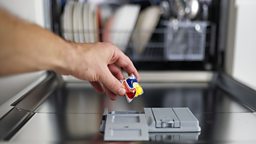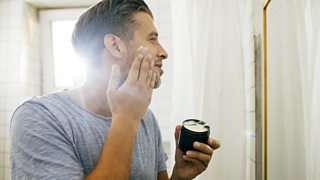Are expensive dishwasher tablets worth the money?
Dishwasher tablets are a prime example of a modern convenience that we rarely question. But are they really worth the prices that we pay and what toll are these chunks of chemicals taking on our environment?
In this episode of Βι¶ΉΤΌΕΔ Radio 4's Sliced Bread, presenter Greg Foot is picking apart dishwasher tablets to see what they’re really made of. Listener Deborah wants to know whether more expensive dishwasher tablets are better cleaners, while Graham is more concerned with what the vague label of 'all-in-one' actually means. Greg is joined by experts from public health and microbiology and consumer testers Which? to clear up not just our dishes but our misconceptions about dishwashing. Here's what you should keep an eye out for with your dishwashing tablets…

Every dishwasher tablet comes with its own layer of plastic
The first thing one notices when using dishwasher tablets is that pesky layer of film on the outside. Sometimes it’s a tight layer on the tablet itself that dissolves automatically during the wash cycle, while cheaper brands have a more traditional wrapper that needs to be removed and binned pre-wash. In either case, the film exists to prevent water getting into the tablet.
Since every single tablet needs this film, however, that’s a lot of disposable plastic floating around. The tight, auto-dissolvable film is made of polyvinyl alcohol (PVA) which, under normal dishwashing conditions, will dissolve. PVA is non-toxic and biodegradable, but may not completely break down in the environment, so there are concerns that PVA contributes to microplastic pollution. Senior Lecturer in Public Health and Microbiology Dr Francis Hassard explains: “Most of our wastewater will go from our dishwasher, through our sewer network, into our wastewater treatment works where most of the plastics will degrade.”
Dishwasher tablets are a cocktail of cleaning chemicals
Within the tablet are a range of chemicals designed to not only clean but protect your dishes. Surfactants alter the surface tension of water to help lift grease and dirt off your dishes and, more importantly, prevent them redepositing back on immediately after. Enzymes – biological catalysts – then act to break down food, much like they do in our own bodies. A form of bleach then comes along to remove stains and kill off any remaining bacteria. With those three ingredients, you have a basic, all-purpose dishwashing tablet.
Some much-touted chemicals do improve your dishwasher's performance
Dishwashing companies will tout that if you shell out a bit more money, you can get additional chemicals for a better cleaning performance. Francis tells us about fragrances and dyes, that “they’re not contributing to the cleaning performance directly. They’re used for… the sensory appeal of the tablet. If it smells clean and looks clean, people think it’s clean”.
Some high-end chemicals really do improve your dishwasher’s cleaning performance, however. Some keep your dishes safe rather than just cleaning them, like glass protectors (for keeping your lovely crystal sparkling) and corrosion inhibitors (ditto for your shiny silverware). These two ingredients are especially important if you live in an area with hard water which is brutal on dishes.
But price and 'all-in-one' claims don't determine quality
Given this specific selection of chemicals, how much variation can there possibly be between different dishwasher tablets on the market? Price-wise, there’s plenty of difference. Store brand dishwasher tablets like Tesco and Sainsbury’s can run you around 10p per tablet, while brand name dishwasher tablets can go as high as 37p per tablet in the case of the Finish Powerball Ultimate All in 1 (which they proudly claim has 14 power actions!)

Which? put various dishwasher tablets through their paces to see whether the cost is justified. But the upshot is that expensive isn't always better.
Head of Product Testing at Which? Matt Knight and his team put these various dishwasher tablets through their paces with a variety of stuck-on foodstuff to see whether the extra cost is justified. The upshot is that expensive isn’t always better. Matt observes that “generally, the more expensive tablets might contain higher concentrations of some of these ingredients” – but that’s it.
The best performing brand was Fairy Platinum All in One (27p per tablet), which was able to combat even the toughest stains. But the Aldi store brand Magnum dishwasher tablets were nearly as effective, and at one third of the price (8p per tablet). One thing they all failed to do, however, was keep glasses sparkling after dozens of washes.
Dishwasher salt and Rinse Aid combat against limescale
As mentioned before, part of what makes glasses lose their lustre is minerals like calcium and magnesium that come with hard water. If you’re more old school, you’ll be combating this limescale build up by putting dishwasher salt into your dishwasher. This salt (literally just high-grade food salt) helps to strip calcium and magnesium off of your dishes and replace them with much safer sodium – plus, the salt helps dry your dishes.
Some dishwasher tablets, however, come with salt and a mixture of chemical s commonly called Rinse Aid (made up of surfactants and preservatives) that helps prevent water spots forming on dishes. Essentially if your tablet has salt and Rinse Aid, you might not need to bother topping up your dishwasher’s salt compartment! As Matt notes, however: “It does depend what area of the country you’re in. So if you’re in a really hard water area, the amount from the dishwasher tablet might not be enough to counteract the hard water.”
Dishwasher tablets can easily contaminate wastewater en masse
For many of us, it’s not just how polished our dishes look that matters, as the impact on our environment is equally important. Given how many chemicals dishwashing tablets are pumping into our wastewater, it’s worth at least being conscious of their impact.
The good news is that dishwashing tablets are safer than ever. They used to contain phosphates – chemicals that would lead to algal blooms in rivers and lakes via a process known as ‘eutrophication’. While the exact science doesn’t bear examining here, the gist is that algal blooms rob aquatic environments of oxygen and kill off other forms of life. With these phosphates removed, and many other chemicals either heavily diluted or designed to biodegrade, dishwashing tablets are safe… mostly.
The chemicals used to prevent corrosion in silverware are benzotriazols, and these compounds are extremely resistant to the biological treatments used in our wastewater treatment plants. Worse, Francis tells us that benzotriazols have a “relatively unknown eco-toxicity… particularly over long-term continued exposure”. With dishwashing contributing a significant proportion of all benzotriazole levels in nature, this issue requires further investigation.
Eco-friendly dishwasher tablets exist… for a price
The good news is, there are eco-friendly options on the market for the more environmentally conscious consumer. Brands like Ecover claim that they use plant-based biodegradable chemicals. While they contain many of the same types of chemicals as regular dishwasher tablets, they’re likely to be more sustainably produced. Naturally the tablets will also likely have little to no phosphates or benzotriazoles, they come in recycled cardboard boxes, and – in the specific case of Ecover – they don’t come wrapped in PVA film wrappers.
The bad news? Being green means paying more. Ecover brand dishwasher tablets cost 41p – that’s more than even the most expensive brand name dishwasher tablets. And since they’re missing some of those extra chemicals, they don’t clean as well as the regular alternative, with a performance that is just average. Matt suggests Sainsbury’s dishwasher tablets as a “happy medium… where it scores really well on packaging assessments” but “it’s not the absolute best cleaner”.
In summary, dishwasher tablets are an incredible product that are more than effective enough to classify as the best thing since Sliced Bread! But choosing which dishwasher tablet you use will, for now, require a trade-off between price, quality and eco-friendliness. Skip the Rinse Aid and you’ll already be shaving pounds off your grocery bill.
To hear more about other forms of dishwashing detergent like powders and liquid, listen to the episode in full on Sounds.
The information contained in this article was correct at the time of broadcast on 22 August, 2024.

More articles from Βι¶ΉΤΌΕΔ Radio 4
-
![]()
Do cholesterol-lowering products actually work?
Greg dips into the world of cholesterol-lowering foods, drinks and medications.
-
![]()
Are expensive face creams worth the money?
Sliced Bread delves into the wide variety of ointments, creams and lotions.
-
![]()
Can fitness trackers actually help you to get fit?
Greg looks at whether an expensive fitness tracker can guarantee better performance.
-
![]()
Can a smart thermostat save you money?
Greg finds out what effect the addition of a smart thermostat might have on your bills.





